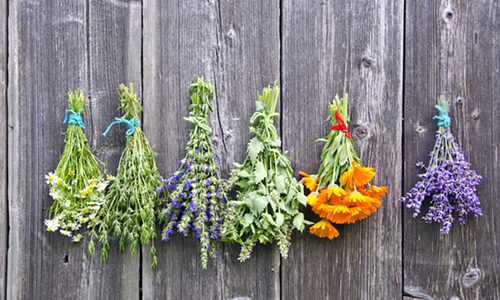

Herbs are delicious and they make our dishes come alive with flavor and variety. Throughout history, herbs have been used not only in recipes and teas, but also medical treatments. Today, most of us have entire cupboards full of dried herbs. We often drink them in the form of caffeine-free teas, cook with them and use them for zesty natural home fragrances. A few of us may even harken back to our ancestors’ beliefs in herbs as treatments for illnesses and maladies.
These fragrant and delicious plants may be varied in their uses, but one thing is for sure: They’re really good for us! Here are just a few of the proven health benefits of herbs.
1. They’re Anti-Microbial
Herbs are anti-microbial, which means they help fight bacteria and harmful germs. The key to this property is herbs’ high concentration of polyphenols, a class of organic chemical micronutrients found in a variety of plants. We’ll hear about some of polyphenols’ other nutritional benefits later, but one of their well-known properties is their ability to fight bacteria. Oregano and dill are two herbs that are particularly chock-full of anti-microbial polyphenols.
2. They Help You Eat Better
This particular attribute isn’t related to a healthful nutrient within herbs, but rather the eating patterns that these plants help us adhere to. When we flavor our dishes with delicious and fragrant herbs, we make them more flavorful and appealing, encouraging us to eat healthy, whole foods. We are also able to reduce the amount of salt we add to our foods because we are adding so much flavor in the form of herbs. While salt isn’t necessarily a bad thing in moderation, herbs are a welcome substitute.
3. They’re Full of Antioxidants
Don’t think of berries and other fruits as the sole proprietors of antioxidants—these healthy foods get many of their antioxidant properties from polyphenols, just like herbs. Herbs provide a stunning number of antioxidants, making them a super nutritious addition to your dishes. Antioxidants bind to free radicals in the body, helping to fight their presence and potentially decrease your risk of certain cancers and chronic diseases.
4. They’re Low-Calorie
Just like vegetables and other leafy plants, herbs are extremely low in calories. Calories aren’t the only important thing to consider when you’re trying to eat healthy, of course, but the fact that using these plants as seasonings won’t impact the caloric count of your dish makes them far superior to dressings, sauces and rubs. If you’re watching your waistline or trying to balance your diet, herbs will be your best bet in terms of flavor additions.
5. They’re Anti-Inflammatory
Finally, just like many spices, herbs are anti-inflammatory. Chronic inflammation wreaks havoc in the body. In fact, according to the Washington Post, it’s suspected to be linked to arthritis, Alzheimer’s, cancer and heart disease. The anti-inflammatory properties of herbs are attributed to—you guessed it—polyphenols. Add some herbs to whole food dishes such as vegetables and fresh meats and you’ll be on your way toward reducing inflammation in your body.
YOU MIGHT ALSO LIKE
9 Steps to Detox Your Body and How it Can Help You Lose Weight
5 Powerful Skin Care Products Found Right in Your Kitchen

 233k
233k  41k
41k  Subscribe
Subscribe 
